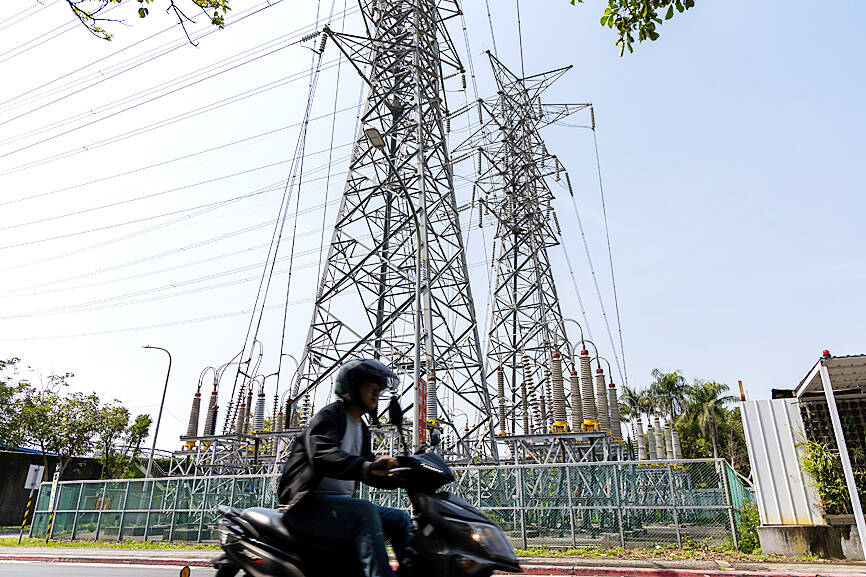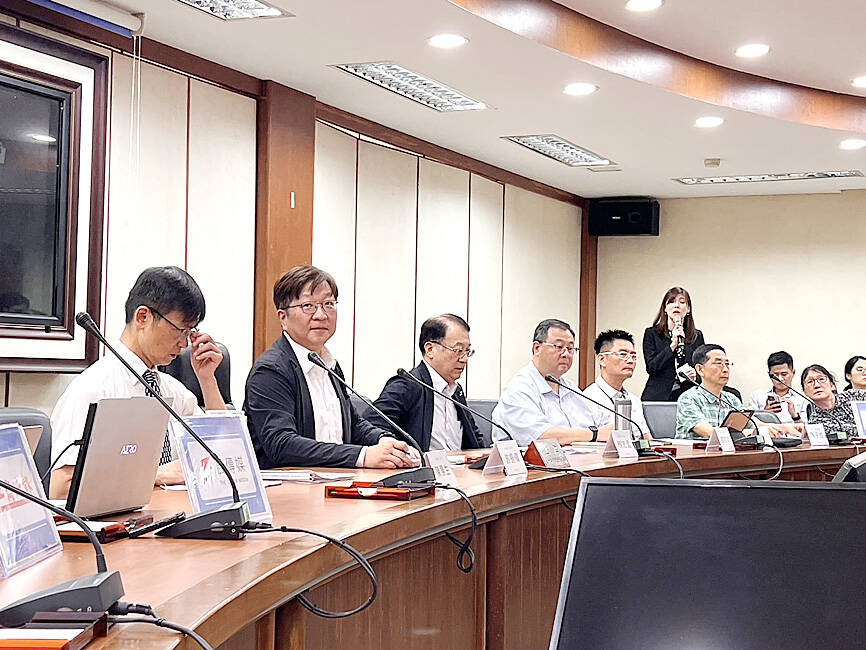Taiwan’s power consumption is to increase faster at an annual compound growth rate of 2.5 percent over the next five years, mainly driven by an eightfold surge in electricity usage by artificial intelligence (AI) applications, the Energy Administration said yesterday.
The latest forecast represented an increase from the 2 percent growth estimated last year for the period from last year through 2029.
The annual growth rate from this year to 2033 is expected to reach 2.8 percent as new data centers for AI applications become operational, the administration said in a report.

Photo: CNA
The increase in demand comes as Taiwan is expected to undergo a strong economic recovery this year, the semiconductor industry expands capacity amid an AI boom and electric vehicles become more popular, the report said.
AI applications including AI-focused data centers would consume about 2.24 gigawatts (GW) of power in 2028, expanding eightfold from 240 megawatts last year, the administration said.
The latest forecast factored in the expected deployment of new data centers, likely from Apple Inc, Nvidia Corp and Amazon Web Services, in addition to existing centers operated by Google, Microsoft Corp and Nvidia.

Photo: Lin Jin-hua, Taipei Times
“Because of AI, Taiwan has to add 12 to 13 percent more capacity during peak load during the 2024-2029 period,” Energy Administration Director-General Yu Cheng-wei (游振偉) told a news conference in Taipei yesterday.
The administration identified this year to 2028 as the critical period when electricity consumption would spike due to rapid uptakes of AI data centers, large-language AI training models and supercomputer centers, which have not been included in the administration’s forecast before.
Peak load demand is expected to expand to about 4.21GW at night from 3.73GW this year, the administration said.
To ensure stable and sufficient supply, Taiwan Power Co (Taipower, 台電) would install more natural-gas generators, enhance electricity grid resilience by revamping electrical substations and expand green energy storage systems, Yu said.
He urged the public to support CPC Corp, Taiwan’s (台灣中油) deployments of new liquefied natural gas (LNG) terminals to regasify LNG before sending it to power stations.
The construction of new LNG terminals was suspended amid environmental concerns.
Taipower projected its reserve margin would improve to 13.3 percent in 2028 from 8.5 percent this year.
That figure is expected to climb to 23.8 percent in 2033, indicating that its electricity capacity would outgrow demand, or capacity adequacy, the state-run utility said.
Asked if the administration would consider restarting or delaying the shutdown of nuclear power plants, Yu said the administration would respect the legislature’s decision on the matter.
Renewable energy is to account for 20 percent of the total power supply in November 2026, rather than the government’s 2025 target, the third time the government has pushed back the goal.
Yu blamed a surge in power consumption for the delays, but said the deployment of renewable energy generation remains on track.
By the end of 2029, green energy is projected to make up about 25 percent of the total power supply, down from 27 percent estimated last year, largely due to increases in total power supply, the report said.

Macronix International Co (旺宏), the world’s biggest NOR flash memory supplier, yesterday said it would spend NT$22 billion (US$699.1 million) on capacity expansion this year to increase its production of mid-to-low-density memory chips as the world’s major memorychip suppliers are phasing out the market. The company said its planned capital expenditures are about 11 times higher than the NT$1.8 billion it spent on new facilities and equipment last year. A majority of this year’s outlay would be allocated to step up capacity of multi-level cell (MLC) NAND flash memory chips, which are used in embedded multimedia cards (eMMC), a managed

CULPRITS: Factors that affected the slip included falling global crude oil prices, wait-and-see consumer attitudes due to US tariffs and a different Lunar New Year holiday schedule Taiwan’s retail sales ended a nine-year growth streak last year, slipping 0.2 percent from a year earlier as uncertainty over US tariff policies affected demand for durable goods, data released on Friday by the Ministry of Economic Affairs showed. Last year’s retail sales totaled NT$4.84 trillion (US$153.27 billion), down about NT$9.5 billion, or 0.2 percent, from 2024. Despite the decline, the figure was still the second-highest annual sales total on record. Ministry statistics department deputy head Chen Yu-fang (陳玉芳) said sales of cars, motorcycles and related products, which accounted for 17.4 percent of total retail rales last year, fell NT$68.1 billion, or

In the wake of strong global demand for AI applications, Taiwan’s export-oriented economy accelerated with the composite index of economic indicators flashing the first “red” light in December for one year, indicating the economy is in booming mode, the National Development Council (NDC) said yesterday. Moreover, the index of leading indicators, which gauges the potential state of the economy over the next six months, also moved higher in December amid growing optimism over the outlook, the NDC said. In December, the index of economic indicators rose one point from a month earlier to 38, at the lower end of the “red” light.

MediaTek Inc (聯發科) shares yesterday notched their best two-day rally on record, as investors flock to the Taiwanese chip designer on excitement over its tie-up with Google. The Taipei-listed stock jumped 8.59 percent, capping a two-session surge of 19 percent and closing at a fresh all-time high of NT$1,770. That extended a two-month rally on growing awareness of MediaTek’s work on Google’s tensor processing units (TPUs), which are chips used in artificial intelligence (AI) applications. It also highlights how fund managers faced with single-stock limits on their holding of market titan Taiwan Semiconductor Manufacturing Co (TSMC, 台積電) are diversifying into other AI-related firms.